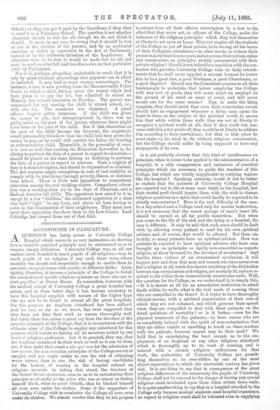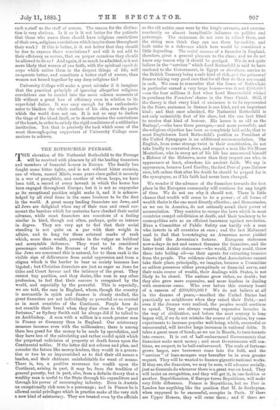AGNOSTICISM IN CARICATURE.
AQUESTION has lately arisen in University College Hospital which seems to us very instructive, as showing how a valuable practical principle may be caricatured so as to become simply ridiculous. University College was, as all our readers know, founded to teach pupils of all religions,—nay, to teach pupils of no religion, if any such there were, whose morality was decent and respectable enough to enable them to associate on equal terms with youths of different faiths. Quite rightly, therefore, it became a principle of the College to forbid the inculcation of specific religions opinions on those who are in statu pup illari at Gower Street. In connection, however, with the medical school of University College a great hospital has arisen, and in these latter days it has become necessary to have this hospital supplied with nurses of the higher type who are now to be found in almost all the great hospitals. For this purpose an Anglican sisterhood has been utilised. And no one, so far as we know, has even suggested that they have not done their work as nurses thoroughly well. But lately there has arisen a great cry from the devotees of the agnostic principle of the College, that it is inconsistent with the ultimate aims of the College to employ any sisterhood for this purpose which insists on having all its members united by one bond of religious profession. Let it be granted, they say, that the Anglican sisterhood do their work as well as it can be done, yet, if they make their creed a sine quel non for the admission of new nurses, the non-sectarian principles of the College are set at naught, and you ought rather to run the risk of obtaining worse nurses, than to run the risk of having candidates for the honour. of nursing in the hospital refused on religious grounds. In taking this stand, the devotees of the Gower Street secularism seem to us to be caricaturing their principle as absurdly as the actor who was so intent on feeling himself black, when he acted Othello, that he blacked himself all over, even under his clothes. Some of the supporters of University College wish to secularize the College all over, even ander its clothes. We almost wonder that they do not propose
to extract from all their officers subscription to a test to the effect that they never act, as officers of the College, under the influence of the religions principles which they feel themselves at liberty to act upon at home. Why not require all the students of the College to put off their private faith during all the hours of their Collegiate attendance,—in other words, to redeem their promises, keep their hearts pure, and overcome their private spites and resentments, on principles strictly unconnected with their private religion? Should it not indeed be a condition with the con- tractor who provides University College with its daily refresh- ments that he shall never appoint a servant because he knows him to be a good Jew, a good Wesleyan, a good Churchman, or a good Baptist? Should not the Committee propose to all their tradespeople to undertake that before supplying the College with any sort of goods, they will never reject an employe' on the ground of his creed or want of creed, and will never accept one for the same reason ? Nay, to make the thing complete, they should insist that even their unsectarian nurses should take an engagement whenever a dying man opens his heart to them on the subject of the spiritual world, to assure him that while within those walls they are not at liberty to recognise a spiritual world at all; that if they could but con- verse with him a few yards off, they would be at liberty to address him according to their convictions ; but that in that place he must make up his mind to die without religious conversation, lest the College should suffer by being supposed to have any propaganda of its own.
Is it not perfectly obvious that this kind of creedlessness on principle, when it comes to be applied to the administration of a hospital, is a silly exaggeration and caricature of practical principles which are necessary to guide the teachers of this College, but which are totally inapplicable to outlying regions like the hospital ? Speaking seriously, would it not be better to explain that the patients of University College Hospital are expected not to die or come near death in the hospital, lest their mortal peril should inspire them with the wish to discuss religious questions in a spirit that could hardly be expected to be
strictly non-sectarian Here is the real difficulty of the case. In a day-school and a College used only for secular instruction, it is not necessary that the secret springs of man's inner life should be opened at all for public inspection. But when you come to the life of the sick and the dying in a hospital, the case is different. It may be said that such cases should be dealt with by allowing every patient to send for his own spiritual adviser, and, of course, that would be allowed. But then, un- luckily, so many patients have no spiritual adviser. How can patients be expected to have spiritual advisers who have oeen brought up on principles so rigidly non-committal as regards religion, as those favoured by the devotees of secularism ? And besides these victims of an overstrained secularism, it will happen now and then that men and women who have never even had a religion at all, much less known anything of the distinction between non-sectarianism and religion, are mortally ill, and are re- quired to die within those immaculately nnsectarian walls. Well, the question for the College, as we understand it, is simply this, —If it is decent at all for an unsectarian institution to admit death within its walls, what is the best mode of nursing those who are compelled to die there Is it better to have thoroughly efficient nurses, with a spiritual organisation of their own of which they are not ashamed, and which governs their speech when they are compelled to deal with these patients on the dread questions of mortality or is it better,—even for the physical treatment of the patients,—to have nurses who are so completely imbued with the spirit of non-sectarianism that they are either unable or unwilling to touch on these matters with the patients, however urgent may be their need ? We hold that in entertaining the least scruple as to the em- ployment of an Anglican or any other religious sisterhood which is thoroughly up to its work of nursing, and is imbued with a certain religions enthusiasm for that work, the authorities of University College are permit- ting themselves to be over-ridden by one of the most abject superstitions to which the nineteenth century has given rise. It is one thing to say that in consequence of the great religions differences of the community the pupils of University College shall not be exposed to the danger of having any special religious creed inculcated upon them when within those walls. It is quite another thing to say that in a hospital attached to the College only because medical students need hospital experience, no regard to religions creed shall be tolerated even in supplying such a _staff as the staff of nurses. The reason for the distinc- tion is very obvious. Is it or is it not better for the patients that those who nurse them should have religions convictions of their own, religions convictions which inspire them throughout their work ? If this is better, is it not better that they should be free to express those convictions ? and will it not add to their efficiency as nurses, that on proper occasions they should be allowed to do so ? And again, if so much be admitted, is it not more likely that women of one faith, with the spiritual esprit de corps which unites them in the deepest things of life, will co-operate better, and constitute a better staff of nurses, than women not bound together by any deep religions tie P
University College will make a great mistake if it imagines that the practical principle of ignoring altogether religious convictions can be carried into the more solemn moments of life without a great loss of efficiency even in relation to its superficial duties. It was easy enough for the enthusiastic actor to blacken the whole surface of his skin, even the parts which the world does not see. It is not so easy to darken the tinge of the blood itself, or to desectarianise the convictions of the heart, in order to satisfy the rigid conditions of a utilitarian institution. Yet that is precisely the task which some of the most thorough-going supporters of University College seem anxious to achieve.



































 Previous page
Previous page